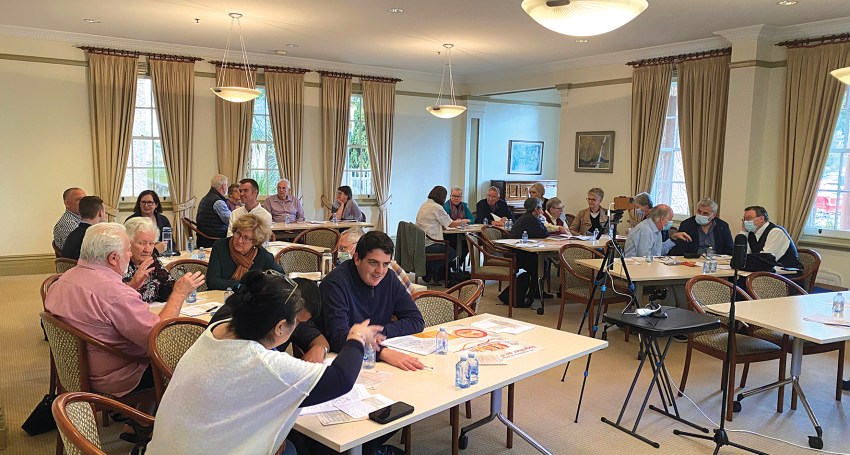Synodality in the life and mission of the Church
Opinion
The first session of the Synod on Synodality ended in Rome at the end of October. Our Archbishop Patrick was present with other representatives from the Church in Australia, along with those from all around the world.

The second session will be in October 2024. Here in the Archdiocese our Archbishop has led us on the journey of synodality as expressed in the theme of our Diocesan assemblies, ‘Together on the Way’.
Our local regional and deanery assemblies this year and the ongoing work of our Diocesan Pastoral Council continue to express this vision of Church as expressed in the documents of the Vatican Council. Let me try to explain what synodality is all about.
Advertisement
I begin with referencing the document Synodality in the Life and Mission of the Church from the Congregation for the Doctrine of the Faith.
First, there’s the endorsement by Pope Francis: ‘It is precisely this path of synodality which God expects of the Church of the third millennium…(it) is an essential dimension of the Church.’
The word synod ‘indicates the path along which the People of God walk together’. Equally, it refers to the Lord Jesus, who presents himself as ‘the way, the truth and the life’ (Jn 14.6) and to the fact that Christians, his followers, were originally called ‘followers of the Way.’ (Acts 9.2) St John Chrysostom writes that the Church is a ‘name standing for walking together.’
The term synodality is not explicitly found in the documents of the Second Vatican Council but its understanding for us as Church clearly is. Again, quoting from the document: ‘The ecclesiology of the People of God stresses the common dignity and mission of all the baptised, in exercising the variety and ordered richness of their charisms, their vocations and their ministries.’
Our understanding of synodality comes directly from chapter two of the ‘Dogmatic Constitution on the Church, The People of God’ from Vatican II. Here we are reminded that God plans to save us not as isolated individuals without any bonds, but precisely by uniting us together as His people.
This was the case with the Israelites who were God’s people of old and now we are the new People of God. What unites us all in this unity is our common baptism. Each baptised Christian is a member of the People of God, each is called to be part of the mission of the Church in building the Kingdom. There’s dynamism here. It’s not static. We are on a journey, on the mission of building the Kingdom of God. We are the Pilgrim People of God. All in the Church are on this journey, all have a part to play, each according to their unique vocation, but all of equal dignity through baptism are united in the one Body of Christ through the Holy Spirit.
If all the baptised are part of the mission of the Church to proclaim the Kingdom of God, all have a role, all are called to be consulted, listened to, to be part of an ongoing dialogue as we discern together the call of the Holy Spirit to us in our times. Synodality involves all in this process. Hence the consultation and listening forums on parish, diocesan, national and continental levels all leading to the first session of the Synod.
Advertisement
Is synodality a democratic process then? Will the majority view at the end be what the Church does? Pope Francis, who is so committed to this path of renewal in the Church, has said, it’s not ‘a poll’ or ‘a parliament’. It’s not just about what the majority may want in the Church. We are not a human organisation in that sense. We are led by the Holy Spirit of Jesus in our discernment and on our pilgrim way.
Earlier this year, Sr Nathalie Becquart, the undersecretary for the Synod of Bishops, held a public meeting in Adelaide speaking of the upcoming Synod on Synodality. She made the point that the understanding of synodality comes from the documents of the Second Vatican Council. In particular, she mentioned the second chapter from the ‘Dogmatic Constitution on the Church, The People of God’.
It’s very telling that after Sr Nathalie spoke of chapter two, she spoke of chapter three, ‘The Church is Hierarchical’. The point being that this is an enduring context of our journeying together on mission. We are not starting from scratch. We are not just listening to the Holy Spirit in the now, as if nothing has gone before us.
Renewal and reform in the Church do not mean that something totally new is emerging. We are not in a vacuum. If we are discerning the call of the Holy Spirit, it’s the same Holy Spirit of God that was speaking through the prophets in the Old Testament, the Spirit in Jesus, the same Spirit given to all after Pentecost and the same Spirit in the early Christian community of the Acts of the Apostles and the same Spirit in the living Word of God and in the Eucharist and all the sacraments with the Church down through the ages. Here’s the living tradition of our faith. If its call is to be renewed in the present it’s precisely because its foundations are forever transcendent and of God.
The Spirit can’t be divided or inconsistent, there’s a continuity here. Yes, there’s a development of understanding of our doctrines and teachings, but a consistency. Here’s the role of the hierarchy. The bishops of the world always in union with the successor of Peter, the Pope, are our guarantors that we remain connected to and consistent with our apostolic traditions founded in Christ, his Gospel and especially his saving event, his suffering, death and resurrection.
On the journey of synodality we must not be tempted to set chapters two and three of the Constitution on the Church from Vatican II in opposition to each other. Neither should we speak of one forgetting the context of the other.
There are not two churches: the new emerging Church of the people and the institutional Church of the hierarchy. This is not Vatican II, this is not synodality. The People of God and the hierarchy go together and mustn’t be set in opposition.
Yes, at times there are tensions here, but it’s the dynamic tension of being true to our traditions whilst we respond to the needs of today. It’s the dynamic space in which the Spirit of God moves us forward.
With our unique roles and responsibilities in the Church, we are all part of journeying together. In the context of Vatican II and faithfully following it, we can have every confidence in following the path of synodality.
Father Dean Marin is Vicar General of the Adelaide Archdiocese








